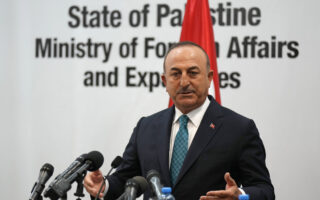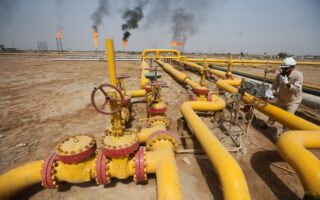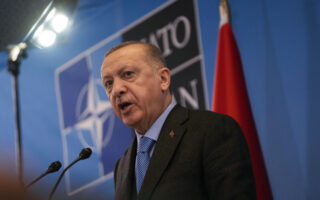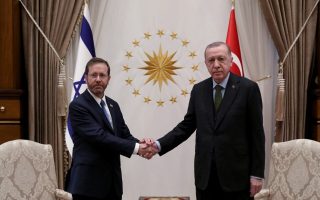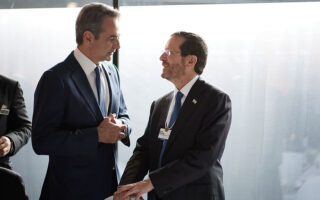‘No country should outsource its security to others’
Israel’s outgoing ambassador to Greece speaks to Kathimerini
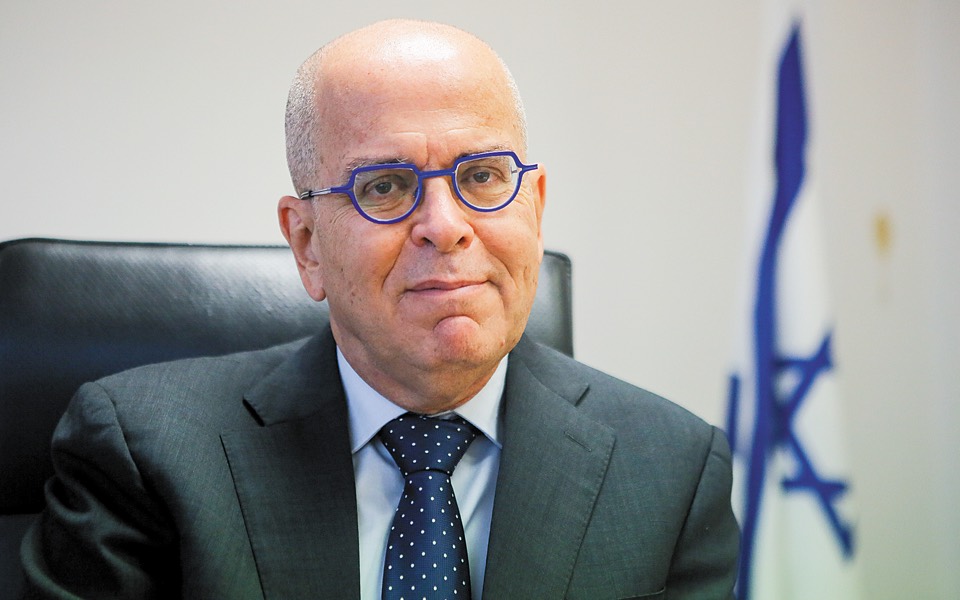
“No country should rely on one friend or another to defend it in a time of crisis, even if it’s only about deterrence,” Israel’s outgoing ambassador to Greece, Yossi Amrani, tells Kathimerini in an interview. While pointing out Greece’s strategic significance, Amrani emphasizes that “no country should outsource its security to others.”
Referring to the EastMed gas pipeline, the Israeli envoy says, “I do not think we have another 10 years to discuss the EastMed project,” while adding that the idea of transferring natural gas from the Eastern Mediterranean must involve as many players as possible.
Meanwhile, Amrani says that the normalization of Israel’s ties with Turkey, currently under way, could benefit relations between Greece and Turkey.
You will be leaving Athens soon after three years here. What memories will you keep from your tenure here?
The memories are quite fresh, bearing in mind it was almost three years ago when we had our introductory interview, and it’s been a bit more than three years since I read your interview with my predecessor. What I can tell you is that time passed too fast, and maybe time does fly when you have so much satisfaction and joy on the job. Those were very busy years, quite hectic, with so many challenges affecting both our countries – mostly it’s been the Covid-19 epidemic – but I think that altogether we have made further progress in the bilateral relationship; we have had things materializing, I think we even identified the potential of the horizon of the relationship between our two countries.
Much has been accomplished, much more is waiting to be accomplished, mostly on regional cooperation and creating infrastructure on cooperation, especially on energy. There is much more room for a bigger bilateral relationship and the relationship between the two countries could and should be the foundation for regional cooperation with other countries. An example is the East Mediterranean Gas Forum (EMGF), the military drills with Greece are yet another example of how you can use Greece to bring other countries from the wider Mediterranean and beyond to cooperate when we talk about a pillar of stability. I think that what we have seen in the last few years is that Greece is translating its geostrategic and geopolitical values into a working plan for the future, so the relationship now is much better than it has ever been. And new opportunities can be opened for both countries.
Some time after your tenure in Athens started, the pandemic began, and now we have the war in Ukraine. Also Israel has entered a new phase in its relations with its Arab neighbors through the Abraham Accords and in general we have seen a shift in geopolitics. One of those shifts that is under way is the normalization of Israel’s relationship with Turkey. Greece and Turkey have had a difficult relationship for most of those years, and even before that – how do you see the regional security architecture shifting because of this?
The war in Ukraine is not over yet and I think it is a little bit premature to assess the implications of the war. The implications will affect all of us. The world before the Russian invasion of Ukraine will not be the same as the world after and we still do not know how this war is going to end and what the exit strategy for the different parties involved in the war is. And it’s not just limited to Ukraine and Russia.
There will be certain lessons from this war and they are not all about military or defense capabilities. It is about alliances, partnerships with different countries, but it’s also about security in the wider meaning of the word: energy security, food security.
In my opinion, not just as an ambassador of one small country to another, Israel to Greece, the only way small countries can overcome all this is through cooperation. You cannot deal with such challenges on your own, it will be too demanding economically and maybe even politically, and it may be beyond our capabilities as countries. So the only way I see is through regional partnerships and being a member of one union or another. International alliance does not preempt or exclude the importance of having other alliances on certain issues. Dealing with the pandemic, dealing with food security and energy challenges – here regional alliances may be ad hoc, hybrid. A formation of alliances can be very helpful.
Energy will be a major challenge – at the moment organizations and leaders issue statements of policy and intentions. At a certain point these will have to be followed by concrete working plans. Those ideas should be materialized, whether through tankers or through pipelines, and this calls for international understanding. There is a need for very close dialogue between leaders seeing the wider picture, and if we as countries cooperate without excluding anyone – everyone who wants to join should join – we can reach a new balance.
After WWII we enjoyed more than 70 years of relative calm with a certain balance and world order. This world order is challenged at the moment. The war in Ukraine is a major challenge and we would have to figure out how our national interests are being served through current partnerships and possible other partnerships. And in that I think we should keep an open mind.
You asked about our relationship with Turkey. Those relationships are not substitutes for the relationship we have with Greece and I think we have made it very clear quite often that improvement of relations between Israel and Turkey does not come at the expense of the relationship between Israel and Greece or Israel, Greece and Cyprus, or any other partnership we are part of. I think if we leverage the improvement in relations with Turkey to deepen our cooperation with Greece, it can be a stabilizing factor and important contribution to you as well. We are not part of your exchanges with Turkey, but if we have better relations with Turkey it may serve your interests as well, and I think this is what we should strive for: building a different regional dialogue where as a region we support our own needs, and in that way play a more constructive role in the world arena; we cannot look to someone else to resolve our problems. We need to be the ones to do this.
Since the war in Ukraine started Turkey has been trying to play the role of a bridge between the West and Russia, but also to promote its regional ambitions. And even though you mentioned more inclusive cooperation between countries in the region, Turkey does not want to be one among equals but rather the one that leads the rest of the region. Can this actually happen? Also, do you see Egypt as having a counterbalancing role for Turkey?
I will not underestimate or undermine any country, big or small, in the region. I would not undermine the importance of the map, the history and the aspirations. And different countries in the region carry a certain imperial power, let’s say. This does not mean that smaller parties in the region are lacking influence, power or significance. All countries, regardless of their size, are equal. I would not even say that some are more equal. The question is how you play your cards. The question I have is how you build your relevance for the future and how you develop strategic importance. Israel is a small country with many challenges, but throughout our history as a sovereign state in 74 years we became a beacon, an anchor, a pillar – beautiful words to describe our strategic value. And this strategic value is a number one contribution to our national security. A country’s national security depends on its performance, economy, social coherence, demography but also on security. And if we made it to the Abraham Accords, which is a milestone achievement not yet appreciated enough for its long-term results, it is because Israel is a player in its region. And it’s a player you can trust and rely on. No country – and I’ve said this to you before, Vassili, in our first interview – should outsource its security to others. No country should rely on one friend or another to defend it in a time of crisis, even if it’s only about deterrence. Countries should develop diplomatic relationships and alliances with as many partners, far and close neighbors, to serve a long-term security goal. Once you develop the economic power, plus the diplomatic network, together with national coherence and defense, you are a player. If I look at the map I cannot underestimate Greece’s role between the East and West, Middle East and Europe. And this is mostly a bridge role for Greece in the future when it gets to infrastructure, and when it gets to security arrangements I would not underestimate it. Turkey is a powerful neighbor of Greece and all the Med countries. I hope that the improvement of relations between Israel and Turkey, which is still in the making, reflects a new Turkish approach to open up to its neighbors. Not from a leadership position, but from a position of being neighbors. Big or small, this is not the issue; the issue is what you bring with you to the table. And here small countries, like Israel, we have a strong economy, much stronger than countries bigger than us and we make a contribution to the world – this is what makes a country relevant. And countries which give up on this effort to build their influence and relevance – if you are not relevant, you are not important.
What do you believe is the most underdeveloped aspect of the relationship between Israel and Greece and has the potential for development?
The number one topic which is not yet keeping pace with other developments in the relationship is the economy. We are very proud of the number of Israeli tourists, we are excited to see Israeli investments in the country’s tourism industry and in real estate. But the less developed dimension is economic cooperation, and in my opinion there is the need to see more Israeli investments in the Greek economy and more joint ventures. Greece is an EU country – I think it’s important for Israeli entrepreneurs to develop joint ventures with Greek businesspeople and benefit from your role in Europe and NATO. There has been some progress, but is it enough? I am not sure. Israeli investments are not easy to make in Greece and there is not an easy way to see them working. I hope we will see future investments which come to fruition and have economic results. This is a field which has quite the potential. I see recent investments in energy in the country – solar energy – that are very important and have potential since the EU and its budget is devoted to digitalization and clean energy – any project which involves these I believe has more potential. I have seen investments in energy, and this is more than welcome. Posidonia has opened and I was quite surprised to learn that Israeli high-technology startups are involved in Posidonia and the Greek shipping industry – with technology which is aimed at efficiency, energy saving and safety. Certain technologies that were developed in Israel are being introduced to Greek shipping companies, and this is a major development. But we can cooperate in many fields and I do hope that in the future we will see a major investment by both countries in R&D to encourage scientists to work together. So, science, technology and the economy is where I would put the emphasis in the future.
And energy, because you mentioned infrastructure – the Israeli government has recently decided to license new research drillings in Israel’s exclusive economic zone – there is already cooperation between Israel and Egypt and there is this need of energy diversification you described for Europe. That natural gas somehow has to reach EU markets – how do you see that happening?
The need is there, the cost of the energy-side decision-making is crucial, and at the moment we in the country are engaging in discussions with the Egyptians and with the EU on exporting more Israeli natural gas to Europe. The open question is how and through which route. I follow very carefully the statements of the Greek government and your involvement in getting Europe to greater energy independence. I would recommend quite an intensive effort to get into a regional understanding on the best routes to export gas. Maybe it will take time at the beginning or more effort through tankers – eventually there should be a pipeline – which will be hydrogen-ready so it will not be an investment limited just to the transporting of gas but to future energy.
Does that mean that somehow in the future this would include the markets of Saudi Arabia and Egypt?
I do not know the details but I think the idea we need to explore is to make an investment which will be economically viable and bear benefits not only for 10-15 years but for 50 years. This is a massive investment. Egypt is a neighbor, a partner, a customer of Israeli gas, so the idea is to ship gas to Egypt. There will be a certain agreement on the quantity which would go from Egypt to the European markets, all those issues have to be discussed, resolved at the highest levels with a very high strategic vision for not only energy independence, but the role of different countries in achieving that goal.
How could Turkey play a part in that? Because you said that at first we would have tankers and similar methods of transport but in the future we would need to have a pipeline and considerable amounts of gas.
With each route you have political problems, you have to look at the map and the territorial “wars” of different countries and it is something which calls for better understanding. I think that inclusion is better than exclusion and, without getting into details which I am not privy to at the moment, we need to look at the cost and the political reality, diversification (the wider meaning of the word). I think Europe will be smart to have more than one option and not limit itself. Otherwise what would Europe have achieved if it replaces one dependency with another? So I think this is high on the European agenda, the Israeli agenda and I hope that the discussion between different protagonists would reach a certain understanding and we will make a move. Twelve years were spent on this cause in the East Med, I do not think we have another 10 years to discuss the EastMed project.
Is EastMed one of the possibilities?
EastMed is a concept. And it is a very valuable and important concept. A concept which benefitted the different partners. But it should not be narrowed down into one route. It should be a concept of how you bring East Med gas from Israeli fields and in the future from Cypriot fields – maybe others as well – into the market. A pipeline is a long-term project. Tankers are a short-term project. Floating storage and regasification units (FSRU) are another option, as are floating liquefied natural gas (FLNG) facilities, but we need to make the move, not continue talks – just public opinion in many countries, especially in Europe, is expecting to see results.
So if I understand correctly, you are talking about a network of pipelines which would somehow bring the players together and leave everyone satisfied.
There are many ideas. I am not talking about any specific idea and I am not discussing any idea in detail because it’s premature. There are ongoing discussions, and of course there are certain agreements and MoUs signed between Israel and Cyprus and Greece about EastMed – we respect all of these. And following the American non-paper we need to revisit the concept of EastMed following the war in Ukraine and the emerging needs of European energy independence. Building a pipeline will take money and time, and it has certain complications. We may resolve them through LNG facilities and tankers, then there’s the idea of a pipeline going from Egypt to Crete and then mainland Greece – this is also for the long term. And there are other ideas – we need to discuss it and reach an understanding, and here, inclusion would be better than exclusion, because with each route you need political agreements between different countries and there is no point in alienating anyone.
There are a lot of things happening between Greece and Israel in terms of defense, and I know that from the Greek side there is the desire to gain experience of the qualitative technology that the Israeli armed forces have already acquired. Are there any discussions in that field?
As you know the chief of staff of the Hellenic Army is in Israel these days; this is part of our ongoing cooperation and exchange of some strategic issues. There is definitely a procurement aspect to the relationship, there is an exchange of know-how and experience. We are more than willing to engage in detailed discussions with the Greek armed forces and the Greek defense establishment on certain Greek needs and to see whether certain technologies can be of help. We are willing to engage in joint R&D. I think that keeping a quality edge is not just a procurement of systems but also a development of systems, and it’s good for the economy, science and the interest of the country. We put it on the table in the past and I think it is relevant to discuss in the future the idea of embarking on joint R&D developing certain responses to future needs. The warfare theater is such that you cannot just prepare for the last war, you have to prepare for the future challenges and as the challenges are becoming more hybrid, high-tech, technology-oriented, so should the response. And Israel maintains a certain edge on this through thinking ahead of the curve of the military reality and we would like to share this experience with you.

